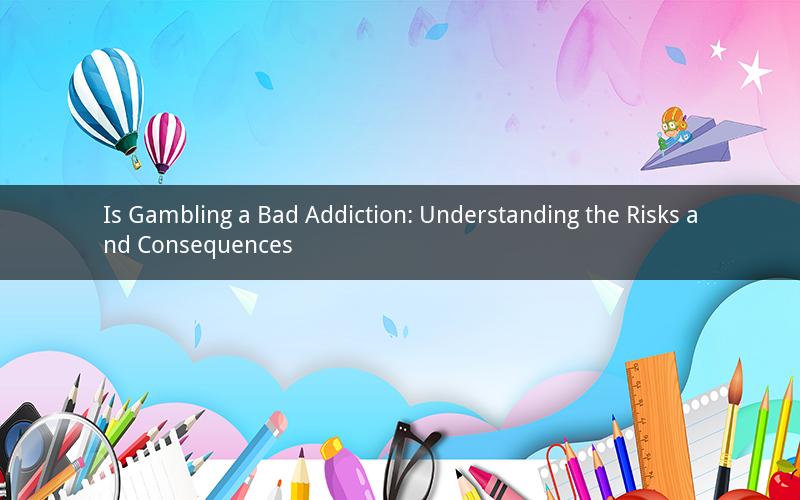
Introduction:
Gambling has been a topic of debate for centuries, with some people viewing it as a harmless form of entertainment, while others argue that it can lead to addiction and have devastating consequences. In this article, we will explore the various aspects of gambling addiction, its risks, and the potential harm it can cause to individuals and society.
1. What is Gambling Addiction?
Gambling addiction, also known as problem gambling or compulsive gambling, is a behavioral disorder characterized by an inability to control the urge to gamble, despite negative consequences. Individuals with gambling addiction often experience intense cravings, preoccupation, and an increasing need to gamble in order to achieve relief from negative emotions or to avoid withdrawal symptoms.
2. Risk Factors for Gambling Addiction
Several factors can contribute to the development of gambling addiction. These include:
a. Genetic predisposition: Research suggests that genetics play a role in the development of gambling addiction, with some individuals being more susceptible to the disorder.
b. Environmental factors: Exposure to gambling opportunities, such as casinos or online gambling platforms, can increase the risk of developing an addiction.
c. Psychological factors: Individuals with certain personality traits, such as impulsivity, risk-taking behavior, and a need for excitement, may be more prone to gambling addiction.
d. Social factors: Peer pressure, family history of gambling, and exposure to gambling in social settings can also contribute to the development of an addiction.
3. The Risks of Gambling Addiction
Gambling addiction can have severe consequences for individuals and their families. Some of the risks associated with gambling addiction include:
a. Financial problems: Compulsive gamblers often experience significant financial losses, leading to debt, bankruptcy, and financial ruin.
b. Emotional and psychological distress: Individuals with gambling addiction may experience feelings of guilt, shame, anxiety, and depression, which can further exacerbate their addiction.
c. Relationship problems: Gambling addiction can strain relationships with family and friends, leading to conflicts, separation, and even divorce.
d. Legal issues: Compulsive gamblers may engage in illegal activities to fund their gambling habits, such as theft or fraud.
4. The Impact of Gambling Addiction on Society
Gambling addiction not only affects individuals but also has broader implications for society. Some of the societal impacts include:
a. Increased crime rates: The financial desperation caused by gambling addiction can lead to an increase in crime rates, including theft, fraud, and embezzlement.
b. Economic burden: The cost of treating gambling addiction, as well as the financial losses incurred by individuals and families, can impose a significant burden on healthcare systems and social services.
c. Social problems: The breakdown of families and communities affected by gambling addiction can lead to increased rates of poverty, unemployment, and social unrest.
5. Treatment and Support for Gambling Addiction
Recognizing the signs of gambling addiction and seeking help is crucial for individuals struggling with this disorder. Treatment options for gambling addiction include:
a. Therapy: Cognitive-behavioral therapy (CBT) and other forms of therapy can help individuals develop healthier coping mechanisms and reduce the urge to gamble.
b. Support groups: Joining a support group, such as Gamblers Anonymous, can provide individuals with a sense of community and support from others who have experienced similar challenges.
c. Financial counseling: Working with a financial counselor can help individuals manage their debts and develop a plan for financial recovery.
d. Residential treatment programs: In some cases, individuals may require residential treatment programs that provide a structured environment for recovery.
Questions and Answers:
1. Q: Can anyone develop a gambling addiction?
A: Yes, anyone can develop a gambling addiction, regardless of age, gender, or socioeconomic status. However, certain risk factors, such as genetics, environmental exposure, and personality traits, can increase the likelihood of developing an addiction.
2. Q: Is it possible to overcome a gambling addiction?
A: Yes, it is possible to overcome a gambling addiction with the right support and treatment. Many individuals have successfully recovered from gambling addiction by seeking help from therapists, support groups, and financial counselors.
3. Q: How can I tell if someone I know has a gambling addiction?
A: Signs of a gambling addiction may include secretive behavior, financial problems, missing work or school, increased stress levels, and changes in relationships. If you suspect someone has a gambling addiction, it is important to approach the topic with sensitivity and offer support.
4. Q: Are there any legal consequences for gambling addiction?
A: While gambling addiction itself is not a criminal offense, the illegal activities some individuals engage in to fund their gambling habits, such as theft or fraud, can result in legal consequences. It is important for individuals with gambling addiction to seek help to address the underlying issues causing their behavior.
5. Q: Can online gambling be more addictive than traditional gambling?
A: Yes, online gambling can be more addictive than traditional gambling due to its convenience, accessibility, and the potential for anonymity. The ease of accessing online gambling platforms can make it more difficult for individuals to control their gambling habits and may lead to faster and more significant financial losses.